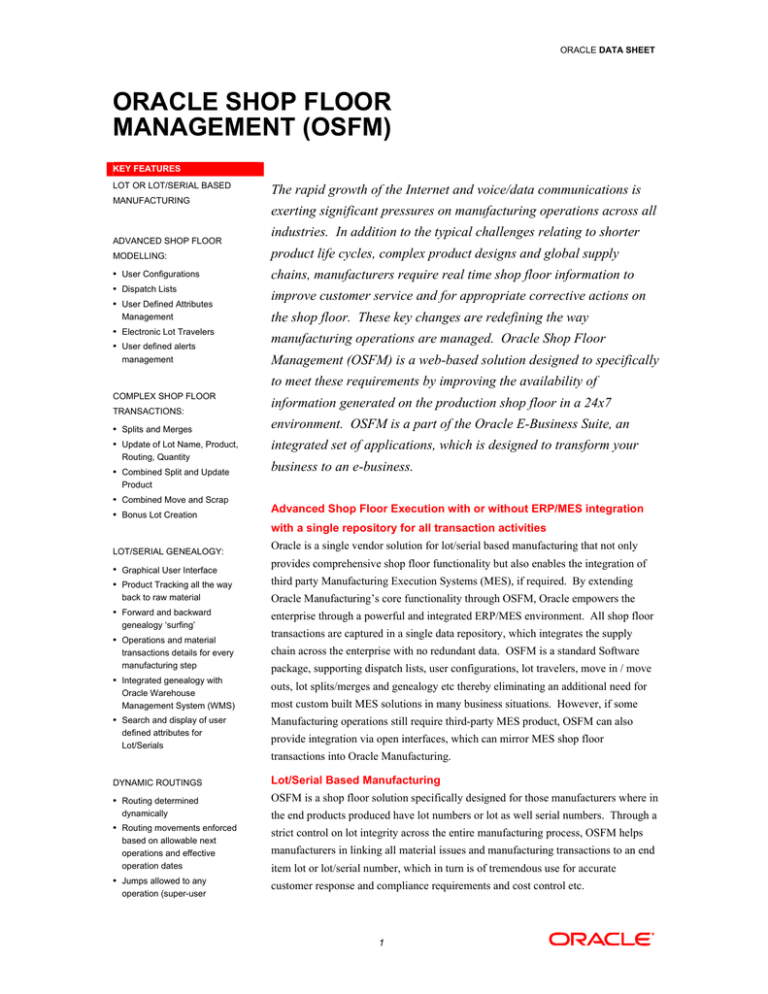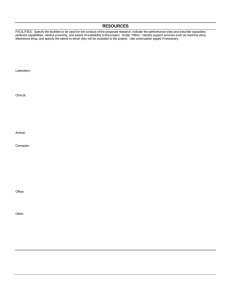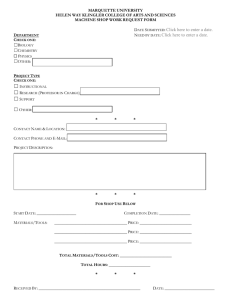
ORACLE DATA SHEET
ORACLE SHOP FLOOR
MANAGEMENT (OSFM)
KEY FEATURES
LOT OR LOT/SERIAL BASED
The rapid growth of the Internet and voice/data communications is
MANUFACTURING
exerting significant pressures on manufacturing operations across all
ADVANCED SHOP FLOOR
industries. In addition to the typical challenges relating to shorter
MODELLING:
product life cycles, complex product designs and global supply
• User Configurations
chains, manufacturers require real time shop floor information to
• Dispatch Lists
• User Defined Attributes
Management
• Electronic Lot Travelers
• User defined alerts
management
improve customer service and for appropriate corrective actions on
the shop floor. These key changes are redefining the way
manufacturing operations are managed. Oracle Shop Floor
Management (OSFM) is a web-based solution designed to specifically
to meet these requirements by improving the availability of
COMPLEX SHOP FLOOR
TRANSACTIONS:
information generated on the production shop floor in a 24x7
• Splits and Merges
environment. OSFM is a part of the Oracle E-Business Suite, an
• Update of Lot Name, Product,
integrated set of applications, which is designed to transform your
Routing, Quantity
• Combined Split and Update
business to an e-business.
Product
• Combined Move and Scrap
• Bonus Lot Creation
Advanced Shop Floor Execution with or without ERP/MES integration
with a single repository for all transaction activities
LOT/SERIAL GENEALOGY:
• Graphical User Interface
• Product Tracking all the way
back to raw material
• Forward and backward
genealogy ‘surfing’
• Operations and material
transactions details for every
manufacturing step
• Integrated genealogy with
Oracle Warehouse
Management System (WMS)
• Search and display of user
defined attributes for
Lot/Serials
Oracle is a single vendor solution for lot/serial based manufacturing that not only
provides comprehensive shop floor functionality but also enables the integration of
third party Manufacturing Execution Systems (MES), if required. By extending
Oracle Manufacturing’s core functionality through OSFM, Oracle empowers the
enterprise through a powerful and integrated ERP/MES environment. All shop floor
transactions are captured in a single data repository, which integrates the supply
chain across the enterprise with no redundant data. OSFM is a standard Software
package, supporting dispatch lists, user configurations, lot travelers, move in / move
outs, lot splits/merges and genealogy etc thereby eliminating an additional need for
most custom built MES solutions in many business situations. However, if some
Manufacturing operations still require third-party MES product, OSFM can also
provide integration via open interfaces, which can mirror MES shop floor
transactions into Oracle Manufacturing.
DYNAMIC ROUTINGS
Lot/Serial Based Manufacturing
• Routing determined
OSFM is a shop floor solution specifically designed for those manufacturers where in
dynamically
• Routing movements enforced
based on allowable next
operations and effective
operation dates
• Jumps allowed to any
operation (super-user
the end products produced have lot numbers or lot as well serial numbers. Through a
strict control on lot integrity across the entire manufacturing process, OSFM helps
manufacturers in linking all material issues and manufacturing transactions to an end
item lot or lot/serial number, which in turn is of tremendous use for accurate
customer response and compliance requirements and cost control etc.
1
ORACLE DATA SHEET
function)
• Support for standard as well
as non-standard operations
Complete visibility on the “shop floor” across the supply chain
By integrating shop floor data into Oracle ERP, OSFM provides enterprise-wide
supply chain transparency of all work orders. For example, in a typical contract
INTEGRATION WITH
manufacturing business scenario, OSFM provides complete visibility of all work
PLANNING/ APS:
orders across different manufacturing plants irrespective of their location, by tracking
• Support for lot and lot/serial
a product’s lot activities from raw material to finished goods. Also, shop floor events
based jobs
• Support for Operation yields
• Scheduling of orders with
network routings
• View and change planning
recommendations at job level
• Co-Product Planning
impacting lots and material such as scrap can be communicated to the ERP system,
thereby providing the input data for corrective action or even customized
notifications to concerned personnel.
Dynamic routing for building and managing flexible manufacturing
operations
OSFM provides the ability to determine routings dynamically, responding to process
YIELD-BASED OPERATIONAL
needs or resource availability. Users can specify operation relationships (for example
COSTING:
going from operation A to either B or F), which are subsequently enforced by OSFM
• Operation level yields
as routings and executed by the operator on the factory floor. It also provides the
• Yielded cost of product
ability to “jump” to any operation. OSFM also enforces intraoperation steps, collects
• Cost variance at operations
• Supports standard costing
engineering data, and specifies resources used.
methods
CO-PRODUCTS/ BOM:
• Modeling of co-products
• Modeling of Phantoms
Figure: 1 Dynamic Routing
Co-product Definitions
OSFM extends the standard Oracle BOM definitions by providing the ability define
an item as the primary component of several end items as well as the expected
distribution of the primary component across all end items. When this information is
defined through the co-products form, the Bill of material for the end items are
automatically created.
Complex Shop Floor Modeling and Transactions
OSFM provides extensive support for complex shop floor modeling as well as
transactions. From a modeling perspective, it provides powerful support for user
configurations based on large number of parameters, dispatch lists based on a
configurable criteria and ability to generate electronic lot travelers at any time. Users
can also define their own attributes for end items and capture them throughout the
manufacturing process.
2
ORACLE DATA SHEET
Figure: 2 Dispatch List
From an execution perspective, OSFM expands an enterprise’s capabilities through
the following functions:
•
Maintain lot names when part numbers change
•
Split and merge lots
•
Update lot names, routings and quantity
•
Manage bonus lots
•
Model co-products
Depending on business models, OSFM can be used in automated shop floor
environments as well as in interactive systems that require manual interventions.
Leveraging the Oracle Applications Internet computing architecture, OSFM provides
user friendly, browser based interfaces.
Figure: 3 Manage Complex Lot Transactions
Collaborative Manufacturing
OSFM allows outsourcing of manufacturing operations by providing the ability to
ship partially finished chips for outside processing to other vendors. Embedded
workflows in outside processing allow automatically transmitted notifications to key
personnel at important predefined events via email. A typical example of this could
be a notification to a shipping manager, as soon as partially finished goods are ready
3
ORACLE DATA SHEET
to be shipped. The notification could also include data, which helps a shipping
manager in organizing a suitable mode of transport.
The outside processing workflows also provide a real time, enhanced graphical view
of the entire notification and approval process showing how far the business process
has progressed.
Capturing and acting on Quality data
OSFM along with Oracle Quality provides the ability define quality collection plans
and collect quality data. It provides collection triggers with collection plans, allowing
the collection of general or specific quality data during the manufacturing process.
By using quality actions such as “place a job on hold” or “launch a workflow” in
collection plans, problems are detected early and can be acted upon them
immediately.
Complete traceability of shipped product through lot/Serial genealogy
Proactive customer responsiveness to product quality issues is a function of tracing
raw materials and lots through manufacturing processes. Unlike traditional
manufacturing environments that have limited capabilities of tracing finished goods
from raw material at the ERP level, OSFM provides complete lot/serial genealogy for
backward and forward visibility across the enterprise. A user-friendly graphical
genealogy interface not only provides the linkages between the parent and the child
lots but also provide details of all the manufacturing operations and material
transactions done during the manufacturing process. Product defects therefore can be
quickly traced to lots and processes. OSFM also helps in the identification of
affected lots (forward explosion) so that customers can be proactively notified. By
leveraging OSFM generated information, processes can also be improved across a
multi-location-manufacturing environment.
Figure: 4 Lot and Serial Genealogy
Driving product profitability by visibility into yielded cost and costs at
operational points
Product and customer profitability are difficult to measure as cost drivers and
4
ORACLE DATA SHEET
KEY BENEFITS
relevant costs are hidden in existing systems. Business planning and evaluation of
performance against plan are complex because cost data is not available at the right
Deploying OSFM helps you
to achieve the following:
• Improved productivity and
efficiency
• Increased shop floor
visibility
• Comprehensive Flexibility
in manufacturing
execution
level, at the right time with the appropriate level of accuracy. Existing profitability
and performance measurement systems do not take into account the cost of scrapped
material. OSFM allows users to specify expected product yield at an operation
determining the “true” yielded cost of a product. By capturing actual scrap at
operations, OSFM provides critical variance data at an operation level. The resulting
cost visibility enables competitive pricing driven by accurate margin analysis.
Scalability
OSFM satisfies the unique requirements of a large spectrum of manufacturers across
RELATED PRODUCTS:
• Discrete Manufacturing
• Work in Process
• Quality Management
• Inventory
the manufacturing industry. Its users could range from large established
manufacturers with multiple sites across the globe to rapidly growing start- ups with
products still in the prototype stage. OSFM also meets the requirements for
companies who outsource 100% or part of their manufacturing operations.
• Bills of Material
• Cost Management
• Advanced Planning and
Scheduling
• Procurement
• Order Management
Conclusion
OSFM is a comprehensive web-based solution which manages dispatch lists,
complex shop floor lot/serial transactions, generates electronic lot travelers, enables
dynamic routings, provides ‘end to end’ genealogy of products, and models/ tracks
operation yield costs. As a part of Oracle E-Business Suite, OSFM bridges the gap
between Oracle Manufacturing and third party MES systems by leveraging critical
shop floor information for enterprise wide activities. It enables comprehensive
flexibility in manufacturing execution and visibility for each lot or lot/serial end item
on the shop floor combining manufacturing excellence with customer responsiveness.
Vertically integrated industries and virtual factories, characterized by product liability
issues, high value added manufacturing cycles, manufacturing yield and profitability
focus, can benefit significantly from OSFM.
Copyright 2006, Oracle. All Rights Reserved.
This document is provided for information purposes only, and the contents hereof are subject to change without notice. This
document is not warranted to be error-free, nor is it subject to any other warranties or conditions, whether expressed orally or
implied in law, including implied warranties and conditions of merchantability or fitness for a particular purpose. We specifically
disclaim any liability with respect to this document, and no contractual obligations are formed either directly or indirectly by this
document. This document may not be reproduced or transmitted in any form or by any means, electronic or mechanical, for
any purpose, without our prior written permission.
Oracle, JD Edwards, PeopleSoft, and Siebel are registered trademarks of Oracle Corporation and/or its affiliates. Other names
may be trademarks of their respective owners.
5


